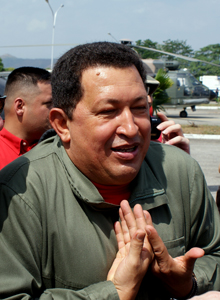Mixed Bag of Venezuelan Leader's Regime
Credit and blame Hugo Chavez deserves both. Experts presented their perspectives on the strengths and weaknesses of Chavez, the controversial president of Venezuela, at a recent symposium on the Tulane uptown campus. Chavez has his shortcomings and his successes, most of the speakers agreed.

Hugo Chavez and his presidency was the subject of talks by 17 international speakers at a Tulane seminar entitled, “Venezuela From the Neutral Ground.” (Photo by Jose Ibanez)
The symposium, “Venezuela From the Neutral Ground,” featured 17 speakers from around the world. A common theme among the scholars was the steadily socialist turn by Chavez and the methods he uses to maintain control.
MarÃa Teresa Romero of the Universidad Central de Venezuela discussed the radicalization of Venezuelan foreign policy in Chavez's leftist government. Romero focused on Chavez's “friend” and “enemy” strategy when it comes to foreign affairs.
“Leftist governments always have an enemy, and it's almost always imperialists,” Romero said. “The U.S. government is the principal enemy of Chavez.”
Margarita Lopez Maya, also of the Universidad Central de Venezuela, spoke about Venezuela's populism and its tendencies. The “left populism” of Chavez focuses on eradicating poverty and inequality, making Venezuela “one of the least unequal societies in America,” she said.
However, with Chavez's growing concentration of power and a weakening of civil and political rights, Lopez Maya said, “We are moving toward a non-liberal state.”
Chavez originally entered office based on popular support from Venezuela's working class, but his ratings have dropped, said Lopez Maya. As evidence of his drop in popularity, Lopez Maya pointed to the Sept. 26 elections in which Chavez did not win by a large majority, revealing his political weakness.
“The main weakness of Chavismo is its inefficiency in resolving everyday problems. This opens opportunities for opposition forces,” Lopez Maya said.
The symposium, held on Friday (Jan. 28), was sponsored by the Tulane Center for Inter-American Policy and Research, the Stone Center for Latin American Studies and the Department of Political Science.
Michaela Gibboni is a sophomore student at Tulane majoring in communication and Spanish.
